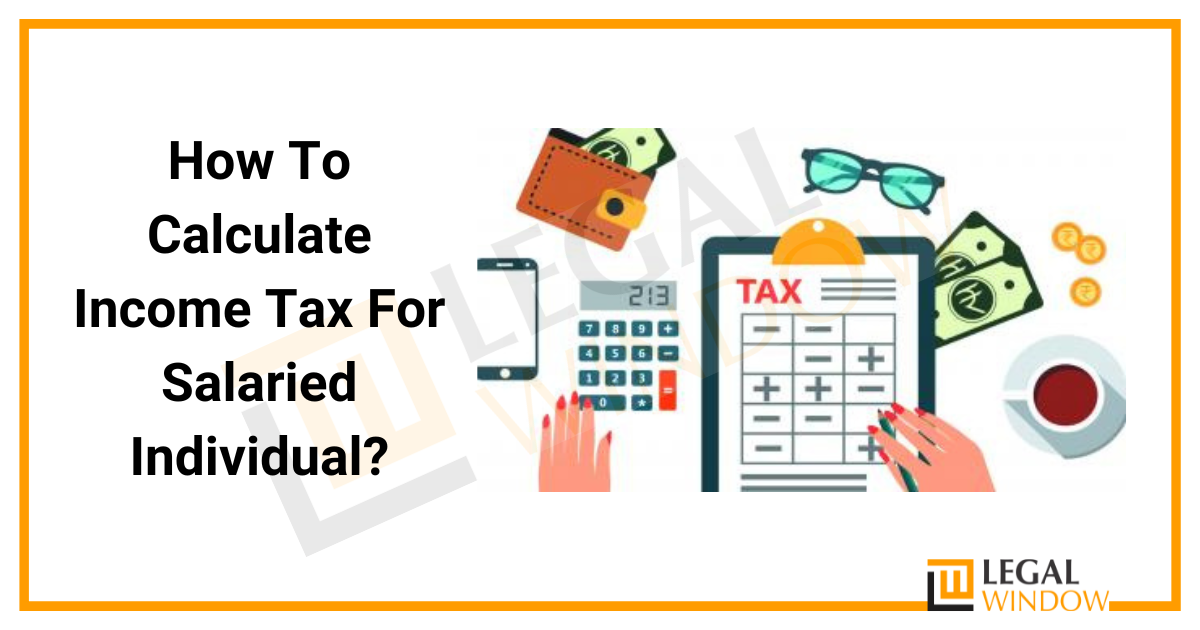
Calculating income tax on salary can be a complex process, as it depends on various factors such as your total income, tax deductions, and applicable tax rates. Income tax is a tax levied by the government on the income earned by individuals, businesses, and other entities. It is one of the primary sources of revenue for governments around the world and is used to fund various public services such as healthcare, education, and infrastructure. The amount of income tax an individual or business owes is typically determined by their taxable income, which is the income earned minus any allowable deductions or exemptions. Tax rates are usually progressive, meaning that the more income an individual or business earns, the higher the tax rate they will pay on their additional income. In this present article, we are going to discuss about how to calculate income tax for salaried individuals.
| Table of Content |
Information about Income Tax
Income tax on salary is a tax levied by the government on the income earned by an individual from their employment. The amount of income tax an individual owes is calculated based on their taxable income. That is their income earned minus any allowable deductions or exemptions. The tax rates are typically progressive, meaning that the more income an individual earns. The higher the tax rate they will pay on their additional income. However, individuals need to file an annual tax return with the government, reporting their income, deductions, and tax liability. This is to ensure that the correct amount of tax has been paid, and any excess tax paid can be claimed as a refund.
The taxable income is calculated by deducting certain exemptions and deductions from the gross salary. Exemptions can include allowances such as house rent allowance, conveyance allowance, medical allowance, and telephone reimbursement. Deductions can include contributions made to a provident fund, payment of insurance premiums, and investment in tax-saving schemes.
Once the taxable income calculates, it is subjected to tax rates as per the tax slabs applicable to the individual. Tax slabs vary between countries, but typically the higher the income, the higher the tax rate. In some countries, there may be a separate tax rate for certain types of income, such as dividends or capital gains. In addition to tax rates, individuals may be eligible for tax credits, which can reduce their tax liability. Tax credits can include contributions made to a pension fund, donations made to an eligible charity, or payment of tuition fees for higher education.
Various Factors of Calculating Income Tax on Salary
The calculation of income tax on salary depends on various factors, including:
- Gross Salary - The total amount of money earned by an individual from their employment, including bonuses, incentives, and allowances.
- Exempted Allowances and Perquisites - Certain allowances and perquisites such as house rent allowance, conveyance allowance, medical allowance, and telephone reimbursement are exempted from income tax up to a certain limit.
- Standard Deduction - Salaried individuals can claim a standard deduction of a certain amount as per the tax laws.
- Professional Tax - In some countries, individuals have to pay professional tax which can be deducted from their gross salary.
- Taxable Income - This is the income left after deducting exempted allowances, perquisites, standard deduction, and professional tax from the gross salary.
- Tax Slab - Tax rates for individuals vary depending on their income slab, with higher tax rates applied to higher income earners.
- Tax Credits - Tax credits such as investment in tax-saving schemes, health insurance premiums, or education loan interest paid can reduce the tax payable.
Calculating Income Tax on Salary
The calculation of income tax on salary can have a significant impact on an individual's financial situation. Here are a few impacts:
- Reduction in Take-Home Salary - Income tax is deducted at source from the salary, which reduces the take-home pay of an employee.
- Impact on Budgeting - Income tax has to be considered while creating a budget for personal finances, as it is a significant expense for most individuals.
- Tax Planning - The calculation of income tax on salary can help individuals plan their taxes more efficiently by taking advantage of tax-saving options such as investments in tax-saving schemes or making donations to eligible charities.
- Compliance with Tax Laws - Calculating and paying income tax on salary is a legal obligation for individuals. Failure to comply with tax laws can result in penalties, interest, and legal action by tax authorities.
- Government Revenue - Income tax is a significant source of revenue for governments around the world. The amount of tax collected impacts the government's ability to fund public services and infrastructure project.
Essential rules and regulations regarding income tax on salary in India
In India, income tax on salary is governed by the Income Tax Act, 1961. The rules and regulations issued under this Act. Here are some essential rules and regulations regarding income tax on salary in India:
- Taxable Income: The taxable income is calculated by deducting the exemptions and deductions allowed under the Income Tax Act from the gross salary. The income tax rates applicable for the assessment year 2022-23 (financial year 2021-22) are as follows:
- Up to Rs. 2.5 lakh: Nil
- Rs. 2.5 lakh to Rs. 5 lakh: 5%
- Rs. 5 lakh to Rs. 7.5 lakh: 10%
- Rs. 7.5 lakh to Rs. 10 lakh: 15%
- Rs. 10 lakh to Rs. 12.5 lakh: 20%
- Rs. 12.5 lakh to Rs. 15 lakh: 25%
- Above Rs. 15 lakh: 30%
- Exemptions and Deductions: The Income Tax Act allows certain exemptions and deductions from the gross salary, such as standard deduction of Rs. 50,000, transport allowance of Rs. 1,600 per month, medical reimbursement up to Rs. 15,000 per year, and exemption on leave travel allowance (LTA) twice in a block of four years.
- Tax Deducted at Source (TDS): Employers are required to deduct TDS from the salary paid to their employees based on the income tax slab rates applicable for the financial year. The TDS deducted by the employer is reflected in the Form 16 issued to the employee.
- Advance Tax: If the tax liability of an individual is Rs. 10,000 or more in a financial year, then they are required to pay advance tax in instalments throughout the year. Failure to pay advance tax can result in interest and penalties.
- Tax Returns: Every individual whose income is above the basic exemption limit is required to file an income tax return every year, declaring their income, deductions, and tax liability. The due date for filing the income tax return is usually July 31st of the assessment year.
- Tax-saving Investments: The Income Tax Act provides various tax-saving investment options such as Public Provident Fund (PPF), Equity-Linked Saving Scheme (ELSS), National Pension System (NPS), and tax-saving fixed deposits. These investments can be claimed as deductions under Section 80C of the Income Tax Act.
Step-by-step Guide to Calculate Income Tax on Salary
Here's a step-by-step guide to Calculate Income Tax For Salaried Individuals:
Step 1: Determine your gross salary- The first step is to determine your gross salary, which includes your base salary, any bonuses, allowances, and perks.
Step 2: Calculate exempted allowances and perquisites- Certain allowances and perquisites such as house rent allowance, conveyance allowance, medical allowance, and telephone reimbursement are exempted from income tax up to a certain limit. Calculate the total amount of exempted allowances and perquisites.
Step 3: Deduct standard deduction and professional tax- If you are a salaried individual, you can claim a standard deduction of a certain amount as per the tax laws. Additionally, you may have to pay a professional tax, which can reduce from your gross salary.
Step 4: Calculate taxable income- Deduct the exempted allowances, perquisites, standard deduction, and professional tax from your gross salary to arrive at your taxable income.
Step 5: Determine tax slab and calculate tax- The tax rates for individuals vary depending on their income slab. Check the tax slab applicable to you and calculate the tax payable using the relevant tax rate.
Step 6: Deduct tax credits- You may be eligible for tax credits such as investment in tax-saving schemes, health insurance premiums, or education loan interest paid. Deduct these tax credits from the tax payable calculated in Step 5.
Step 7: Final tax payable- The final tax payable is the amount of income tax you owe after deducting the tax credits from the tax payable calculated in Step 5.
 Takeaway
Takeaway
It's necessary to stay up to date with the rules and regulations related to income tax. In your country ensure that you are calculating and paying the correct amount of tax on your salary. Failing to comply with tax laws can result in penalties, interest, and legal action by tax authorities. It's worth noting that income tax laws and rates can vary from country to country. In most countries, individuals need to file an annual tax return with the government, reporting their income, deductions, and tax liability. Employers are typically responsible for withholding income tax from their employee's paychecks and remitting the tax to the government.
Company Secretary and diligent learner deeply immersed in the world of corporate law, compliance, and governance with a focus on developing a robust foundation in legal principles and corporate practices. Passionate about exploring the intricacies of company law, regulatory compliance, and corporate governance.
Categories
- Agreement Drafting (23)
- Annual Compliance (13)
- Change in Business (37)
- Company Law (150)
- Compliance (90)
- Digital Banking (3)
- Drug License (4)
- FEMA (17)
- Finance Company (42)
- Foreign Taxation (9)
- FSSAI License/Registration (15)
- GST (124)
- Hallmark Registration (1)
- Income Tax (214)
- Latest News (36)
- Miscellaneous (170)
- NBFC Registration (8)
- NGO (18)
- SEBI Registration (6)
- Section 8 Company (10)
- Start and manage a business (27)
- Startup/ Registration (134)
- Trademark Registration/IPR (48)
Recent Posts
- Major Upgrade: Breaking Down GST 2.0 September 15, 2025
- New Income Tax Bill 2025 August 27, 2025
- ITR-3 Form Explained: Who Should File & Step-by-Step E-Filing Guide (FY 2024-25) June 25, 2025
All Website Tags
About us
LegalWindow.in is a professional technology driven platform of multidisciplined experts like CA/CS/Lawyers spanning with an aim to provide concrete solution to individuals, start-ups and other business organisation by maximising their growth at an affordable cost.










